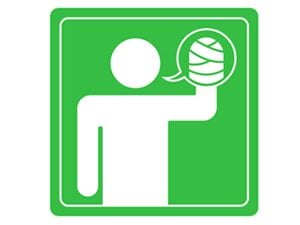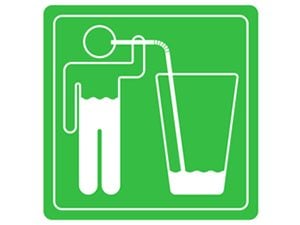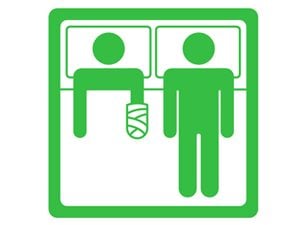What to Do Before Same Day Surgery
Updated: Apr. 16, 2016
A health reporter shares the key tips that weren't mentioned in official pre-op instructions but had a dramatic impact on her recovery.


Drink Up
It’s vital that there’s nothing in your stomach during general anesthesia (food or drink could be a choking hazard). But if you’re well hydrated, you’ll feel better and your veins will be fully dilated—and thus more receptive to IV fluids and drugs. If your cutoff for food and water is at midnight, drink plenty of clear fluids (not alcohol) during the evening until then. The common “midnight” deadline assumes that your surgery is bright and early. If your procedure is in the afternoon, ask if the cutoff can be moved closer to the time of surgery.
Cancel Your Manicure
Skip the presurgery splurge. The anesthesiologist needs polish-free fingers to monitor your oxygen levels while you’re sedated. “The pulse oximeter must be able to send and receive light through your fingertip, and acrylics and other nail coatings interfere,” says anesthesiologist Steven Gayer, MD, chair of the American Society of Anesthesiologists committee on ambulatory surgical care.
Curb the Herbs
Tell your doctor about any supplements you take. About 70 percent of surgery patients don’t think to do so, but it’s important. Even benign-sounding substances like fish oil can increase bleeding, while others, such as kava and St.-John’s-wort, may prolong the effects of anesthesia. Your surgeon may advise you to stop taking certain supplements two weeks prior to surgery, if possible.
Wash Away Germs
Infected incisions are always a big concern—and a major source of the germs that cause them is your own skin. Shower the night before and the morning of your surgery with antibacterial soap, or, even better, use a special wash, like Hibiclens, which kills germs on contact and helps protect your skin for the next 24 hours, advises J. Wesley Alexander, MD, director of research at the Shriners Hospitals for Children in Cincinnati. (Look for a wash that contains chlorhexidine and some alcohol.) Three cautions: Don’t use chlorhexidine if you are allergic to it (if you have any allergies, ask your doctor
or pharmacist if it is safe). Don’t put chlorhexidine on your head or genitals—it’s too harsh. And don’t use bleach when you wash the towel you’ll use to dry off; doing so can cause a permanent reddish-brown stain. Use an oxygen-based laundry product, such as OxiClean, instead.
THAT MORNING
Answer With a Smile
Be patient as everyone you meet asks your name and what procedure you’re having done on which body part. The Joint Commission, which accredits more than 20,000 U.S. health-care organizations, requires double-checking by everyone along the way. It’s also wise to have someone act as your second eyes, ears, and voice. Write down your medications and medical history beforehand in case you forget.
Avoid a No-Caffeine Headache
For many, the worst part of having a procedure is waking up afterward with a roaring headache. This is three times more likely to occur if you would normally start your day with a mug of coffee or tea, and the risk rises with the additional cups you’d usually consume. A patient pal who loves her java and has had numerous outpatient surgeries suggested this trick: Ask your doctor if you can take a caffeine tablet (NoDoz or Vivarin; one tablet is equivalent to one cup of coffee) with a sip of water first thing in the morning on the day of your procedure. My health team gave me permission, and it worked great: Because I’d had my caffeine fix, I could cheerfully agree when asked to delay surgery for an hour.
Snuggle Up
Accept the blanket offered in pre-op. Several studies show that staying warm can lower your risk of infection. Low temperatures decrease blood flow to the skin, which reduces the number of immune cells present to fight infection.
De-stress with a Pre-Op Scent
At my hospital, a volunteer visited pre-op to offer aromatherapy. Turns out, there’s some solid science behind the pampering. When 50 pre-op patients in Minnesota inhaled a lavender scent and placed a drop of oil on their skin, their anxiety levels fell 28 percent, and they entered the operating room significantly less tense than those who got a placebo oil or no special treatment. “When you’re extremely anxious, you may need more medication, which can lead to more side effects,” says Margo Halm, RN, director of nursing research at Salem Hospital in Oregon. (But ask first before you bring your own oils. Some facilities have strict no-fragrance policies because they may irritate fellow patients.)

BACK HOME
Have a Sleepover
You’ll be required to have someone drive you home, but it’s better if a companion is around for at least 24 hours (this is especially important for older patients). You may not be thinking clearly for a full day after anesthesia and may need help changing dressings or fetching snacks and meds.
Don’t Tough It Out
If your pain isn’t well controlled, you’re more likely to suffer nausea and vomiting, says Jan Davidson, RN, director of ambulatory surgery at the Association of Operating Room Nurses. Make sure the discomfort is under control before you go home, and don’t skip prescribed painkillers.
Postpone the Dentist
Check with your surgeon before having dental work during the first six weeks after a surgery. Depending on your procedure, you may need to reschedule your appointment or take antibiotics to avoid infection.
Susan Ince has 30 years of experience as a health reporter. Her work has appeared recently in Good Housekeeping and Prevention.












